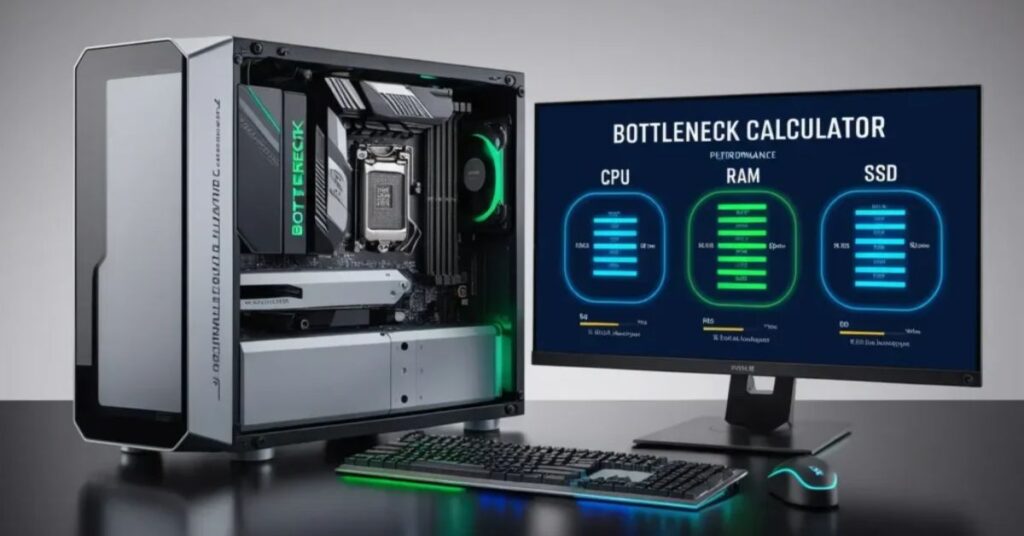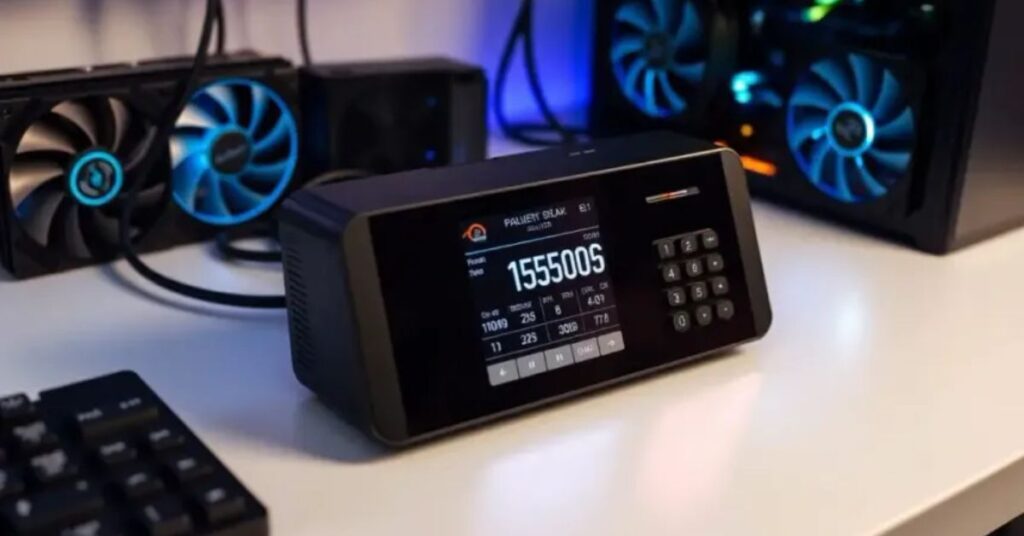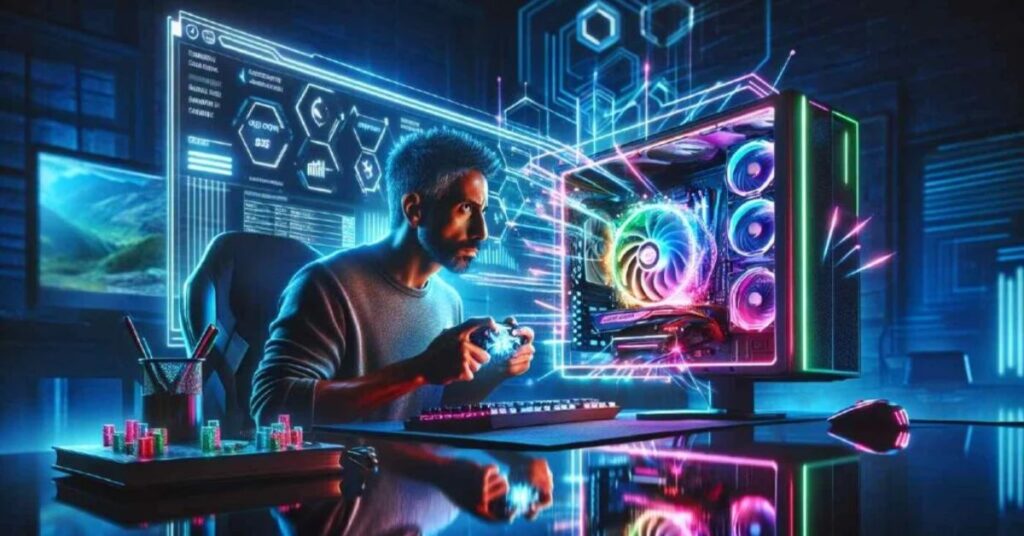A Bottleneck Calculator is a valuable tool for PC users looking to optimize their system’s performance. It helps identify hardware limitations that could hinder overall efficiency, ensuring users get the most out of their components. By analyzing key parts like the CPU, GPU, RAM, and storage, the calculator reveals if any part of the system is underperforming, creating a bottleneck.
This information is essential for gamers, content creators, and anyone seeking to improve their computer’s speed and capability. In this article, we’ll explore how Bottleneck Calculators work, their limitations, and how to interpret the results effectively to enhance your system’s performance.
What is a PC Bottleneck?
A PC bottleneck occurs when one component of your system limits the performance of the others. For instance, if your CPU is outdated and can’t keep up with the demands of a modern GPU, your gaming experience will suffer due to inconsistent frame rates. Similarly, insufficient RAM frequency or a slow storage device can also throttle overall system efficiency.
Understanding bottlenecks is vital because every component contributes to the performance of a balanced system. If your Ryzen 5 5600X processor is paired with an RTX 4060 GPU, but your memory bandwidth is inadequate, you won’t get the most out of your setup. Real-life examples highlight how mismatched components lead to performance dips. For instance, running a powerful GeForce RTX 4090 at 4K resolution with an older CPU architecture can lead to significant CPU GPU bottlenecks.
Understanding Bottleneck Calculators

A bottleneck calculator is a tool that evaluates your PC’s hardware and identifies the limiting factor affecting your system’s performance score. By analyzing your CPU specifications, GPU specifications, and other hardware components, the tool provides insights into potential bottleneck identification.
The process is straightforward. You input details like your graphics card, CPU clock speed, and RAM timings into the calculator, which then evaluates their compatibility. For example, the GPUCheck Bottleneck Calculator simplifies this process with its easy-to-use interface. It breaks down performance bottlenecks, showing whether you need hardware upgrades or software optimizations.
Key Components Analyzed by a Bottleneck Calculator
CPU (Central Processing Unit)
Your CPU handles processing tasks, including running applications and maintaining system stability. A CPU bottleneck occurs when its clock speed, core count, or architecture cannot handle the demands of a modern GPU, like the Radeon RX 6600. Upgrading to a powerful processor, such as the Ryzen 7 5800X3D, can mitigate this issue.
GPU (Graphics Processing Unit)
The GPU is essential for gaming and rendering, making it one of the most analyzed components. A GPU bottleneck often arises when you push your system to run demanding graphics settings at 1440p or 4K resolution. Monitoring GPU utilization can highlight if your graphics card is the limiting factor.
RAM (Random Access Memory)
The frequency and timings of your RAM influence how well your system handles multitasking. Low RAM frequency or insufficient capacity can lead to memory considerations that slow down your system.
Storage Devices
Using outdated HDDs instead of faster SSDs can lead to poor system performance. Storage bottlenecks are common in systems without NVMe SSDs.
Display Resolution & Refresh Rate
High screen resolution and refresh rates require balanced hardware. For example, achieving 144Hz at 1080p demands a CPU and GPU balance to avoid performance bottlenecks.
| Component | Common Issue | Solution |
| CPU | Low clock speed | Upgrade to higher core count CPUs |
| GPU | High-resolution demands | Upgrade to RTX 4060 or above |
| RAM | Low frequency | Use faster RAM, e.g., DDR4 3600MHz |
| Storage | Slow read/write speeds | Switch to NVMe SSDs |
Read Also: Hearthstats Net News: The Ultimate Gaming Resource
How Does a Bottleneck Calculator Work?
A bottleneck test involves analyzing the compatibility of your hardware. For example, pairing a Ryzen 5 5600G with an RTX 4060 and running a calculator will reveal whether the CPU limitations impact your gaming PC bottleneck. The tool evaluates CPU and GPU utilization ratios, helping you understand the severity of bottlenecks on a scale from 0-100.
The calculator’s algorithms assess your system specifications, factoring in architecture, core count, and memory bandwidth. It also predicts potential thermal throttling by analyzing high GPU temperatures during intensive tasks.
Common Bottleneck Scenarios and Solutions
System bottlenecks occur when one component limits overall performance. These issues vary depending on hardware setups and usage scenarios. Understanding and addressing CPU, GPU, RAM, storage, and display bottlenecks is crucial for optimized performance.
CPU Bottleneck
A CPU bottleneck happens when the processor cannot keep up with the demands of the software or other hardware components, like a high-end GPU. This often affects performance in gaming, multitasking, or heavy computations. Upgrading to a faster CPU or optimizing background tasks can alleviate this issue, ensuring smooth operation.
GPU Bottleneck
A GPU bottleneck arises when the graphics card struggles to render graphics-intensive tasks, often in 4K gaming or high-resolution editing. Reducing graphical settings or investing in a more powerful GPU can resolve this. Proper pairing of GPU and CPU also minimizes this problem.
RAM Bottleneck
Insufficient RAM can hinder system performance, particularly in multitasking or running memory-intensive applications. When the system runs out of available memory, it resorts to slower storage, causing lags. Upgrading to more RAM with faster speeds resolves these issues effectively.
Storage Bottleneck
Slow storage, such as HDDs, creates a storage bottleneck that delays data retrieval, leading to slower load times in games and applications. Replacing an HDD with an SSD or upgrading to NVMe storage significantly boosts performance and reduces bottlenecks in data-heavy tasks.
Display Bottleneck
A display bottleneck occurs when the monitor’s refresh rate or resolution limits the experience, even with high-performance hardware. For example, a 60Hz monitor won’t fully utilize a GPU capable of producing 120 FPS. Upgrading to a high-refresh-rate or higher-resolution display is the best solution.
Trusted Bottleneck Calculators
Bottleneck calculators help evaluate the compatibility of PC components. They analyze performance gaps between your CPU and GPU. These tools assist in optimizing hardware configurations.
PC Builds Bottleneck Calculator
The PC Builds Bottleneck Calculator is a popular tool among enthusiasts. It provides detailed insights into how well your CPU and GPU work together. Users can input component details to predict performance issues and identify potential upgrades for a balanced build.
The Bottlenecke Calculator
The Bottlenecke Calculator is designed for quick and accurate assessments. It offers a simple interface where users can enter PC specs. The tool generates a performance report highlighting whether the bottleneck arises from the CPU or GPU, aiding in decision-making.
GPUCheck Bottleneck Calculator
GPUCheck Bottleneck Calculator specializes in analyzing GPU performance. It evaluates how efficiently a GPU operates with the rest of the system. Known for its detailed graphics-related insights, it also compares game-specific bottlenecks to suggest optimal resolutions and settings.
| Bottleneck Calculator | Key Feature | Best For |
| PC Builds Bottleneck Calculator | Predicts hardware compatibility and balance | General users building PCs |
| The Bottlenecke Calculator | Quick bottleneck detection and component analysis | Casual users needing fast results |
| GPUCheck Bottleneck Calculator | Focuses on GPU and gaming performance insights | Gamers and graphics-intensive users |
Tips for Effectively Using a Bottleneck Calculator
- Gather accurate specifications for your hardware, including CPU, GPU, RAM, and storage.
- Consider the specific workload, such as gaming, video editing, or multitasking, as bottlenecks vary by task.
- Compare results from multiple calculators like PC Builds or GPUCheck for comprehensive insights.
- Interpret bottleneck results wisely—minor bottlenecks may not significantly affect performance.
- Upgrade hardware based on your budget and the areas identified as most critical for improvement.
Read Also: MonkeyGG2: Revolutionizing The Gaming World
Upgrading Your PC to Eliminate Bottlenecks
Upgrading your PC can drastically improve performance by removing bottlenecks that slow down operations. Identifying weak components and replacing them with better ones ensures smooth multitasking and gaming. Let’s explore the steps to achieve an optimized and efficient system.
Step 1: Identify the bottleneck component.
The first step is diagnosing the weakest part of your system, such as the CPU, GPU, or RAM. Use diagnostic tools like Task Manager or third-party apps to monitor performance. Pinpoint components that hit 100% usage during intensive tasks to find the main bottleneck.
Step 2: Research compatible upgrades.
Check your PC’s specifications and research upgrades that fit your motherboard and power supply. Look for components that offer a balance between performance and cost. Ensure compatibility to avoid unnecessary expenses and get the best value for your investment.
Step 3: Plan the upgrade.
Once you’ve selected upgrades, plan the process carefully. Check installation guides, required tools, and potential risks. Consider how the new component will affect airflow, power requirements, and other parts of the system. Proper planning ensures a smooth upgrade experience.
Step 4: Execute and install upgrades.
Turn off the PC and unplug it before installing new components. Carefully replace the outdated part with the new one, following manufacturer instructions. After installation, double-check all connections to avoid setup errors. Ensure the system is secure before turning it back on.
Step 5: Test system performance post-upgrade.
After upgrading, run performance tests to evaluate improvements. Use benchmarking tools to measure speed, responsiveness, and temperature levels. Compare results with pre-upgrade metrics to confirm that bottlenecks have been eliminated effectively. Adjust settings if needed for optimal performance.
Summary Table for Step and Key Actions
| Step | Key Actions |
| Identify bottleneck | Use diagnostic tools to find the weak component. |
| Research upgrades | Ensure compatibility and budget-friendly options. |
| Plan the upgrade | Check guides, tools, and system compatibility. |
| Execute upgrade | Safely install and replace outdated parts. |
| Test performance | Benchmark and compare pre- and post-upgrade results. |
Balancing Your PC System for Optimal Performance
Balancing your PC system ensures all components work smoothly without one part overpowering others. An unbalanced system, like pairing a high-end GPU with a weak CPU, can lead to bottlenecks. Matching hardware capabilities is key to unlocking the full potential of your PC.
Regular maintenance also plays a role in balancing performance. Update drivers, optimize software, and ensure proper cooling to prevent overheating. A well-tuned system boosts efficiency, supports multitasking, and delivers consistent performance for all tasks, from gaming to work.
Specialized Bottleneck Calculators
Specialized Bottleneck Calculators are essential tools that help users identify performance limitations in their computer systems. By calculating potential bottlenecks, these calculators assist in optimizing hardware configurations for better performance. They cover a wide range of components like RAM, SSD, gaming performance, and more, ensuring a smooth and efficient system.
| Bottleneck Type | Description |
| RAM Bottleneck Calculator | This tool analyzes if your system’s RAM is slowing down performance. It checks for insufficient memory allocation or compatibility issues. |
| SSD Bottleneck Calculator | It checks whether your SSD is limiting overall system speed. A slower SSD can delay load times and data transfer rates. |
| Game Bottleneck Calculator | This calculator helps gamers assess whether their CPU, GPU, or RAM is causing lags in gaming performance. It ensures the system is balanced. |
| Laptop Bottleneck Calculator | It analyzes whether a laptop’s components, such as the CPU or GPU, are causing slowdowns. This is particularly useful for optimizing gaming or work tasks. |
| PC Builds Bottleneck Calculator | This tool checks for imbalances in a PC build. It ensures that the components, like GPU, CPU, and RAM, complement each other for optimal performance. |
Future-Proofing Your System Against Bottlenecks

Investing in quality components ensures longevity and compatibility with future software needs. Pairing upgrade-friendly motherboards and PSUs with overclockable hardware offers flexibility for future upgrades. Staying current with industry trends helps anticipate system requirements and plan ahead.
Anticipating future workloads also involves choosing the right hardware. Opt for higher clock speed processors and GPUs with ample memory bandwidth to meet evolving demands. Upgrades like the Ryzen 7 5800X3D or GeForce RTX 4090 future-proof your system effectively.
| Upgrade Suggestion | Benefits |
| Higher RAM Capacity | Reduces memory bottlenecks |
| Faster SSDs | Improves load times and system efficiency |
| High-Performance GPUs | Handles peak gaming at high settings |
What are the limitations of bottleneck calculators?
Bottleneck calculators are tools designed to estimate system performance limitations. However, they come with certain limitations that can affect accuracy. These calculators rely on assumptions and may not always reflect real-world performance.
| Limitation | Explanation |
| Estimation Errors | Bottleneck calculators often provide rough estimates that may not be accurate. Minor errors in estimations can lead to incorrect predictions of system performance. |
| Database Limitations | The databases used by these tools may not always have up-to-date hardware or software information, limiting the calculator’s accuracy. |
| Software Factors | These calculators often overlook unique software configurations, which can lead to discrepancies in results. Software behavior can vary, affecting system performance. |
Trusted Bottleneck Calculators
When choosing a bottleneck calculator, it’s crucial to select reliable tools that can provide accurate insights into system performance. Trusted calculators often offer detailed assessments based on the latest hardware data and user configurations.
List of reliable bottleneck calculators
Here are a few trusted bottleneck calculators commonly used by tech enthusiasts and system builders:
- UserBenchmark – Offers a comprehensive analysis of your system and provides performance comparisons.
- PC Builds Bottleneck Calculator – Helps assess bottlenecks in custom-built systems based on specific components.
- GPUCheck – Focuses on detecting GPU-related bottlenecks and recommends upgrades.
- Game-Debate – Primarily used for gaming setups, it calculates the potential bottlenecks based on game requirements.
How to choose the right calculator for your needs
Selecting the right bottleneck calculator depends on your specific needs. For gaming, you might prefer tools like Game-Debate that focus on gaming performance. If you’re building a custom PC, calculators like PC Builds Bottleneck Calculator are ideal as they offer a more tailored approach. Always ensure the calculator you choose is up-to-date and includes data relevant to your hardware.
Read Also: Geekzilla.tech De Donde Son: Origins, Impact, And Future Insights
Conclusion
Bottleneck calculators are essential tools for understanding and optimizing system performance. While they offer valuable insights, users must be mindful of their limitations, such as estimation errors and database restrictions.
By choosing the right calculator for your needs and understanding its strengths and weaknesses, you can make informed decisions about upgrading or adjusting your system. Ultimately, these calculators are only one part of the puzzle in achieving optimal performance, but they serve as a helpful guide in the process.
FAQs About Bottleneck Calculator
What is a Bottleneck Calculator and why is it important for PC users?
A Bottleneck Calculator is a tool that helps identify performance limitations in a computer system. It helps users understand which hardware components may be limiting overall performance.
How do I use a Bottleneck Calculator effectively?
To use a Bottleneck Calculator, input your system’s hardware specifications, such as the CPU, GPU, RAM, and storage. The tool will analyze and provide insights on potential bottlenecks.
Can Bottleneck Calculators identify all performance issues?
No, Bottleneck Calculators can identify hardware-related bottlenecks but may not pinpoint software or other system issues.
Are Bottleneck Calculators completely accurate?
No, these calculators are based on algorithms and estimations, so they may not always provide 100% accuracy.
How do I interpret the results of a Bottleneck Calculator?
Results show if a particular component, such as the CPU or GPU, is limiting performance. Higher percentages indicate greater potential bottlenecks.
What common bottleneck scenarios can a calculator help identify?
Bottleneck Calculators help identify common issues like CPU bottlenecks, GPU limitations, or mismatched RAM performance that may affect overall system efficiency.
Unlock More Stories on Topics You Love…

As a seasoned website Content Writer with three years of experience, I specialize in delivering engaging and informative content on a variety of general topics. Explore my work at “https://timesrenewal.com/“.






